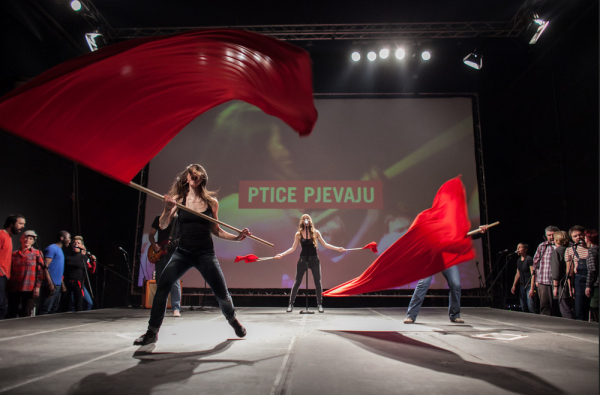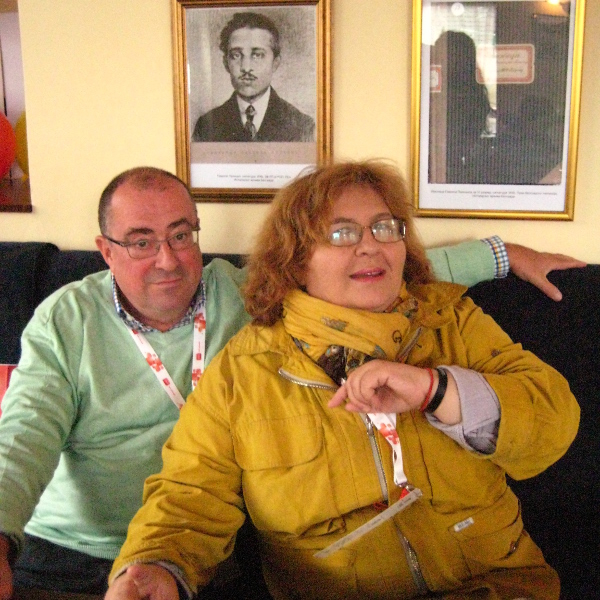Michael Coveney: Bitef in Belgrade raises the bar for international theatre

The Belgrade International Theatre Festival – Bitef – is one of the most important in Europe. And in this centenary year of the Great War, the roots of the conflict that re-shaped the world are seen in the context of radicalism and territorial re-alignment that continues today in the Balkans, where it all started. In fact, I started where it all started, too.
The Bitef hub and press office this year is the café in Belgrade where the Serbian revolutionaries hatched their plan to assassinate the Archduke Franz Ferdinand in Sarajevo. And I spent some time talking, sipping coffee and tapping on my iPad while seated directly beneath a photograph of Gavrilo Princip, the man who fired the fateful shot. Like Zelig in the Woody Allen film, I felt, however spuriously, that I was a part of history, or at least marginally implicated.
This often happens in Bitef, where I’ve been going for many years, originally when invited as editor of a theatre magazine; Bitef was an essential melting pot of East and West during the Cold War. I was there when Tito had just died – the occasion marked with a production of Hamlet which became an urgent polemic about the succession – and I was there, in the streets, on the night when Milosevic was defeated in the election, with a sense of military occupation reinforced by a Ukrainian version of Three Sisters on the main stage of the National Theatre right there in the Republic Square, the heart of the city.
So, whereas our own theatre has commemorated the centenary in a series of plays about the British involvement on the Western Front, Bitef reconsiders the upheavals in the Austro-Hungarian and Ottoman empires that defined the country that became the former Yugoslavia before tearing itself apart in the tragic wars of the 1990s. For the Serbs, this centenary is not about trench warfare but all warfare, invasion, genocide, collaboration and ethnic cleansing.
And the plays reflected that – notably a brilliant Polish production that re-cast the mythical stories of Agamemnon and Clytemnestra, Alcestis and her self-sacrifice, the labours of Hercules, in the context of collaboration with the Nazis in the death camp at Treblinka. It is always a Bitef priority – and one that just happens, never "enforced" – that classical drama is about the here and now. And that is what great directors are for, to make those connections; there is no play in the Balkans, or indeed Eastern Europe, that is not political.

Everything is urgent, everything is pressing. The Bitef selectors – Anja Suša and Jovan Cirilov – always draw themes, and write great essays, around their choices, not to set an agenda, but to "make a festival," which is the very opposite of what happens in Edinburgh, for instance, where the international programme is mostly compiled by what is made commercially available to the director, and the fringe is mostly "open access" and without any kind of quality control (except at the Traverse, and I’m not too sure about that this year). Bitef believes in the efficacy of art.
This year’s Bitef – the forty-eighth since 1967, with no year missing, even at the height of the wars – was sub-titled "Past is Present" and so it was hugely ironic that easily the worst play I saw not only bore that title but deviated badly from the historic and political imperatives in the bland and boring "home movie" theatricality of a Bangladeshi documentary filmmaker living in Berlin whose subject is his own family. Needless to say, perhaps, the show was Swiss, and it’s a mystery to me as to how it slipped through the Bitef net.
The main Bitef programme is surrounded by related talks, discussion and workshops, not a fringe as such, though I was struck by an event from Sweden at the Centre for Cultural Decontamination (a vibrant ICA-like venue started in a lovely old Belgrade town house in direct response to the wars of the 1990s) which used vox pop stories, à la Alecky Blythe, to investigate the possibility of there being such a thing as a good deed in a naughty night of a world.
These stories, edited into a simply staged show (a few chairs, a few actors) Acts of Goodness came from the Backa Theatre in Gothenburg, Sweden. A mugger returns the scene of his crime and comforts his victim. A wife goes crazy when her husband offers to hold the fort while she goes on holiday. A do-gooding liberal girl takes in a homeless person. All of these situations were rife with energy, tension, fear. And in a supplementary anthology of testimony, we heard the story of a transgender boy/girl in rough house, working class Warrington is given an unexpectedly easy ride when he/she meets an old school friend in a social context.
After just a few days at Bitef I’m already suffering withdrawal symptoms. Luckily for me, last night‘s outlandish Berlin production of Ibsen’s An Enemy of the People by middle-aged enfant terrible Thomas Ostermeier made me feel right back at Bitef again. It ends on Sunday: don’t miss it.










